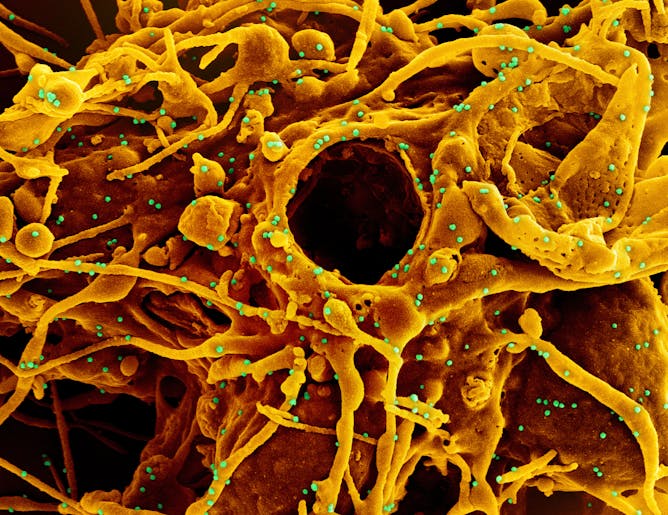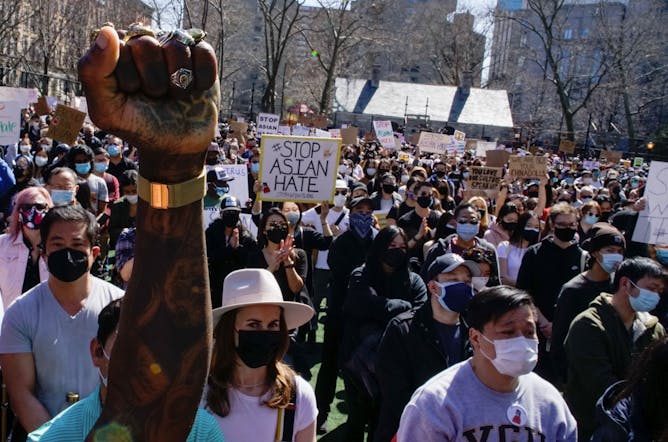|
|
|
|
In the past week, the rolling daily average for new COVID-19 cases in Canada nearly hit 8,500. Just yesterday, Ontario alone posted 4,736 new cases. With the third wave in danger of becoming a tsunami, many people have questions about the mutated versions of the SARS-CoV-2 virus — called variants — that are driving these outbreaks.
Today in The Conversation Canada, York University microbiologist Dasantila Golemi-Kotra has the answers including how the variants emerged, why they seem to be more contagious, how viruses mutate and the likelihood of a vaccine-resistant super-variant.
Also today:
Regards,
|
Patricia Nicholson
Health + Medicine Editor
|

|
|

Colorized scanning electron micrograph of a cell (orange) infected with UK B.1.1.7 variant SARS-CoV-2 virus particles (green), isolated from a patient sample. Image captured at the NIAID Integrated Research Facility (IRF) in Fort Detrick, Maryland.
(NIAID)
Dasantila Golemi-Kotra, York University, Canada
Variants of the original SARS-CoV-2 are now in wide circulation. That means the third wave of COVID-19 has come with new questions about the variants, their effects and what might come next.
|

For more than 20 years, Canada has repeatedly missed its targets to reduce greenhouse gas emissions. It is the only G7 country whose emissions have increased since 2010.
(Shutterstock)
Normand Mousseau, Université de Montréal; Corinne Le Quéré, University of East Anglia
Bill C-12 is a step in the right direction, but its not enough to meet Canada's goal for a decarbonized economy.
|

After George Floyd’s death at the hands of police in Minneapolis, Minn., protestors all over the United States, including in Los Angeles, pictured here on May 30, 2020, demonstrated against police brutality.
(Shutterstock)
Temitope Oriola, University of Alberta
The continued killings of Black people at the hands of the police in the United States has contributed to an environment of continued marginalization and oppression.
|

With the pandemic, pathways to permanent residence have been disrupted.
THE CANADIAN PRESS/Graham Hughes
Luin Goldring, York University, Canada; Patricia Landolt, University of Toronto
The system turns employers into immigration enforcement officers and generates a population of people without status who live and work in Canada without a clear path to security of presence or livelihood.
|

The family business is among the most common organizations in the world. But figuring out succession plans is rife with complications.
(Unsplash)
Peter Jaskiewicz, L’Université d’Ottawa/University of Ottawa; Alfredo De Massis, Free University of Bozen-Bolzano; Marleen Dieleman, National University of Singapore
As aging parents wonder about the future of the family businesses they founded, four succession strategies could help.
|

People take part in a rally against hate and confront the rising violence against Asian Americans at Columbus Park in New York, on March 21, 2021.
(AP Photo/Eduardo Munoz Alvarez)
Cary Wu, York University, Canada; Abidin Kusno, York University, Canada; Ann H. Kim, York University, Canada; Carol Liao; Dennis Kao, Carleton University; Guida Man, York University, Canada; Hae Yeon Choo, University of Toronto; Jing Zhao, University of British Columbia; Min Zhou, University of Victoria; Muyang Li, York University, Canada; S. Harris Ali, York University, Canada; Sibo Chen, Ryerson University; Sida Liu, University of Toronto; Weiguo Zhang, University of Toronto; Zhifan Luo, University at Albany, State University of New York
Fifteen Asian academics discuss the roots of anti-Asian racism and limits of multiculturalism in Canada while charting a path forward.
|
La Conversation Canada
|

Une ambiance plus décontractée se fait ressentir lors de réunions actives et cela pourrait favoriser davantage les interactions sociales entre collègues.
Shutterstock
Valérie Hervieux, Université Laval; Caroline Biron, Université Laval
Les réunions actives réduisent le stress pendant les rencontres et diminuent la fatigue habituellement ressentie dans les heures suivant celles-ci.
|

Le vice-amiral Haydn Edmundson dirige le commandement du personnel militaire, qui lui donne autorité sur la carrière des militaires reconnus coupables d’inconduite sexuelle. Accusé d’avoir agressé sexuellement une subordonnée, il est en congé avec solde pour une durée indéterminée.
La Presse Canadienne/Justin Tang
Karyne Gélinas, Saint Mary’s University
Il y a quelque chose qui cloche chez les militaires canadiens. Et il est nécessaire de comprendre plus profondément comment persistent dans l’armée les inégalités et les inconduites.
|
Podcasts
|
-
Gemma Ware, The Conversation; Daniel Merino, The Conversation
Plus, what Israel's latest election could mean for its foreign policy. Listen to episode 11 of The Conversation Weekly podcast.
|
|
Environment + Energy
|
-
Jill Johnstone, University of Saskatchewan; Heather Dawn Alexander, Auburn University; Michelle C. Mack, Northern Arizona University; Xanthe Walker, Northern Arizona University
A new study finds deciduous trees are increasingly dominant after severe fires in the region, and that has some unexpected impacts.
|
|
Science + Technology
|
-
Alexa Hagerty, University of Cambridge; Alexandra Albert, UCL
Emotion recognition technology raises questions about bias, privacy and mass surveillance.
|
|
| |
| |
| |
| |
| |
| |
|
|
|
|
|
|
|